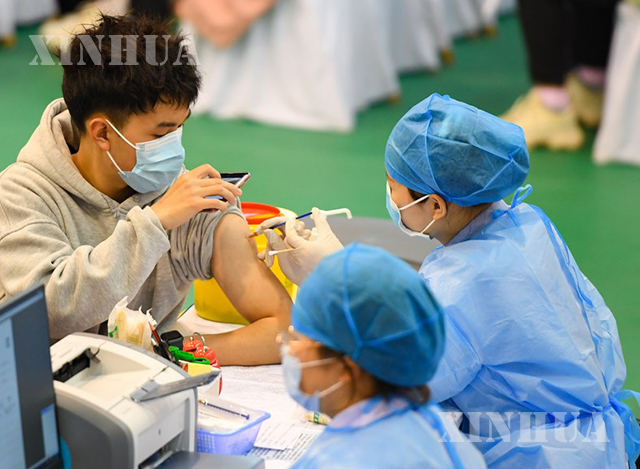CHINA
တရုတ်နိုင်ငံ၏ COVID-19 ရောဂါ တုံ့ပြန်ကိုင်တွယ်ပုံမှာ ချီးကျူးစရာကောင်းကြောင်း IMF အရာရှိပြော

ပေကျင်း၊ဧပြီ ၈ရက်(ဆင်ဟွာ)
တရုတ်နိုင်ငံ၏ COVID-19 ကပ်ရောဂါ တုံ့ပြန်ကိုင်တွယ်ပုံမှာ ချီးကျူးစရာကောင်းကြောင်း နှင့် ကြီးမားသောအကျပ်အတည်းတစ်ခုကို အောင်မြင်စွာ ကျော်လွှားနိုင်ခဲ့ကြောင်း အပြည်ပြည်ဆိုင်ရာ ငွေကြေးရန်ပုံငွေအဖွဲ့(IMF) မှ တာဝန်ရှိသူတစ်ဦးက ဧပြီ ၆ ရက်တွင် ပြောကြားခဲ့သည်။
“ သူတို့ဟာ ကပ်ရောဂါကို အလွန် ပြင်းထန်စွာ ၊ အလွန်စောလျဉ်စွာပဲ ဟန့်တား ချိုးနှိမ်နိုင်ခဲ့တာပါ” ဟု အပြည်ပြည်ဆိုင်ရာ ငွေကြေးရန်ပုံငွေအဖွဲ့ နှင့် ငွေကြေးဈေးကွက်ဌာန ညွှန်ကြားရေးမှူး Tobias Adrian ၏ ပြောကြားချက်ကို ကိုးကား၍ CNBC သတင်းဌာနက ဖော်ပြခဲ့သည်။
တရုတ်နိုင်ငံ၏စီးပွားရေးသည် “ ယခင်နှစ် နှစ်လယ်ပိုင်းကတည်းက ပုံမှန်အနေအထား အဆင့်တစ်ခုကို ပြန်လည်ရောက်ရှိနေပြီးဖြစ်ပါတယ် ၊ ဒါဟာ ကမ္ဘာပေါ်က ဘယ်နိုင်ငံကိုမဆို လမ်းပြနေတာပေါ့” ဟု Adrian က CNBC သတင်းဌာနသို့ ပြောကြားခဲ့သည်။ကြီးမားသောအကျပ်အတည်းတစ်ခုကြုံတွေ့ခဲ့ရခြင်းနှင့်အတူ တရုတ်နိုင်ငံသည် နဂိုအတိုင်း တစ်ဖန်ပြန်ရောက်ရှိအောင် “အောင်မြင်စွာကျော်လွှားနိုင်ခဲ့ကြောင်း” IMF အရာရှိက ဆိုသည်။(Xinhua)
———————————————-
(English Version)
China’s response to COVID-19 impressive: IMF official
BEIJING, April 8 (Xinhua) — China’s response to the COVID-19 pandemic is impressive, and it has once again fared well in a major crisis, said an International Monetary Fund (IMF) official on Tuesday.
“They have cracked down on the pandemic very aggressively, very early,” Tobias Adrian, director of the IMF’s Monetary and Capital Markets Department, was quoted by CNBC as saying.
The Chinese economy “really already came back to normal levels at the middle of last year, so way ahead of any country in the world,” Adrian told CNBC.
Faced with a major crisis, China has once again “fared very well,” said the IMF official.
Photo- A student receives a dose of COVID-19 vaccine at a temporary inoculation site at Hunan University of Science and Technology in Xiangtan, central China’s Hunan Province, April 1, 2021. (Xinhua/Chen Zeguo)






